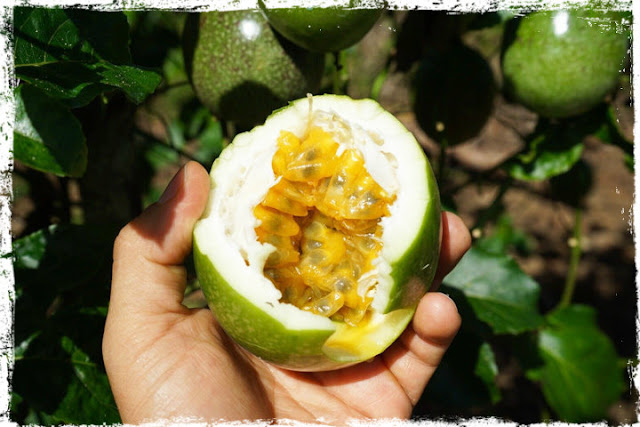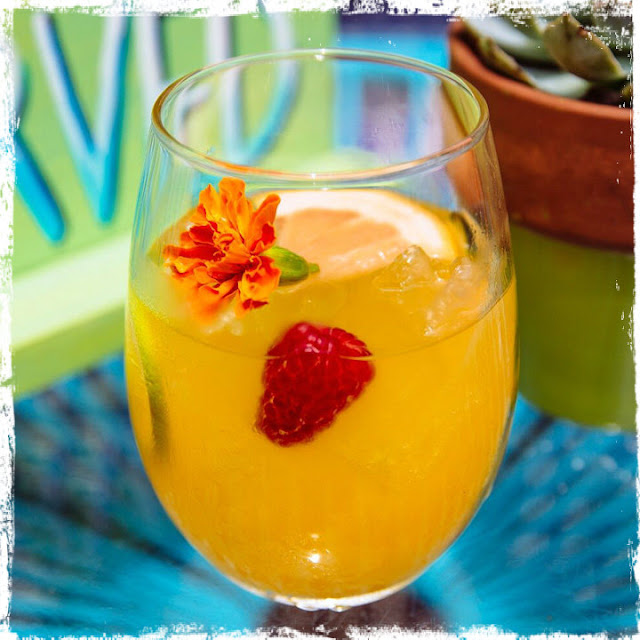Americans have a newfound passion for passion fruit. Between 2015 and 2017, the dark, seedy berry saw a 15 percent increase on menus, according to global market research firm Mintel’s 2018 U.S. Flavor Trends report. There have long been liqueurs that deliver the sweet, acidic flavor of passion fruit, such as Giffard and Passoã, but the newest kid on the block, Chinola, has made an immediate and juicy splash.
Produced in the small, agricultural town of Majagual, Dominican Republic, Chinola is a partnership between Michael Krychowecky, Andrew Merinoff and Robert Pallone, along with Bar Lab, the hospitality consultancy behind tropical bar Broken Shaker, which has locations in Chicago, Los Angeles, Miami and New York City. The tall bottle, with a label illustrated by tropical elements, is filled with the bright, orange liqueur that’s shelf-stable without the use of additives or preservatives. This is somewhat rare in world of fruit liqueurs, which sees its share of hypersweet high-fructose-corn-syrup-laden products.
Produced in the small, agricultural town of Majagual, Dominican Republic, Chinola is a partnership between Michael Krychowecky, Andrew Merinoff and Robert Pallone, along with Bar Lab, the hospitality consultancy behind tropical bar Broken Shaker, which has locations in Chicago, Los Angeles, Miami and New York City. The tall bottle, with a label illustrated by tropical elements, is filled with the bright, orange liqueur that’s shelf-stable without the use of additives or preservatives. This is somewhat rare in world of fruit liqueurs, which sees its share of hypersweet high-fructose-corn-syrup-laden products.
“We use the most citrus-forward fruit possible,” he says. Chinola is growing the fruit and producing the product all in the same location, with the hopes of doing for passion fruit what St-Germain did for elderflower.
“We’re planting the vines,” he says, which are grown biodynamically and organically. They’re also picking the fruit, removing the seeds and then bringing the pulp to the distillery, where it’s blended with high-proof cane spirit, which “neutralizes it without adding heat or chemicals.”
Chinola uses a naturally occurring enzyme to break down the pulp before the final blending, with rum. Each bottle contains the juice of about 12 to 18 passion fruits. While it’s rather traditionally produced, the end result is anything but, with a smooth, purely fruity flavor that stands on its own for a spritz or highball and blends nicely with rum and agave spirits.
The distillery works on a closed system, with the local farmers living on the land. “We have their families come in to help us process at certain times of the year,” says Merinoff. “In the next year, we’re growing a minimum of a few hundred-thousand passion fruits a month but will soon get to over a million.”
As for what drew Broken Shaker to the partnership, Bar Lab hospitality consultancy co-founder Gabriel Orta says the team at the bar loved using passion fruit but it didn’t fit in the budget.
“Passion fruit is one of our favorite ingredients, but it’s hard to get and expensive,” says Orta. “When we tried [Chinola], we were hooked on the versatility to make drinks with it.”
Drinking Chinola truly has the feel of drinking fresh passion fruit juice, its 21 percent ABV almost dangerously unapparent, allowing your base spirit to take center stage against a backdrop of precise fruit flavor.
“We use it in one drink called the Liquid Swords,” says Orta. The cocktail features “lemongrass gin, Chinola, citrus and grapefruit beer with a spicy rim.” Others suggest you simply mix it, 50-50, with your favorite mezcal for a balance of tart, acid, floral and smoke.
This summer, the liqueur has expanded beyond the rooftops of Broken Shaker and ended up in cocktails in Montauk and elsewhere in New York City, but for now, it’s easiest to find in Miami or online.
In Austin, where it’s not yet available, the bar Academia features a cocktail called the Waiting for Chinola that uses a different passion fruit flavoring by Liber & Co. But if you can get your hands on it, even when summer’s long gone, you’ll have a bit of the tropics in a bottle.




No comments:
Post a Comment